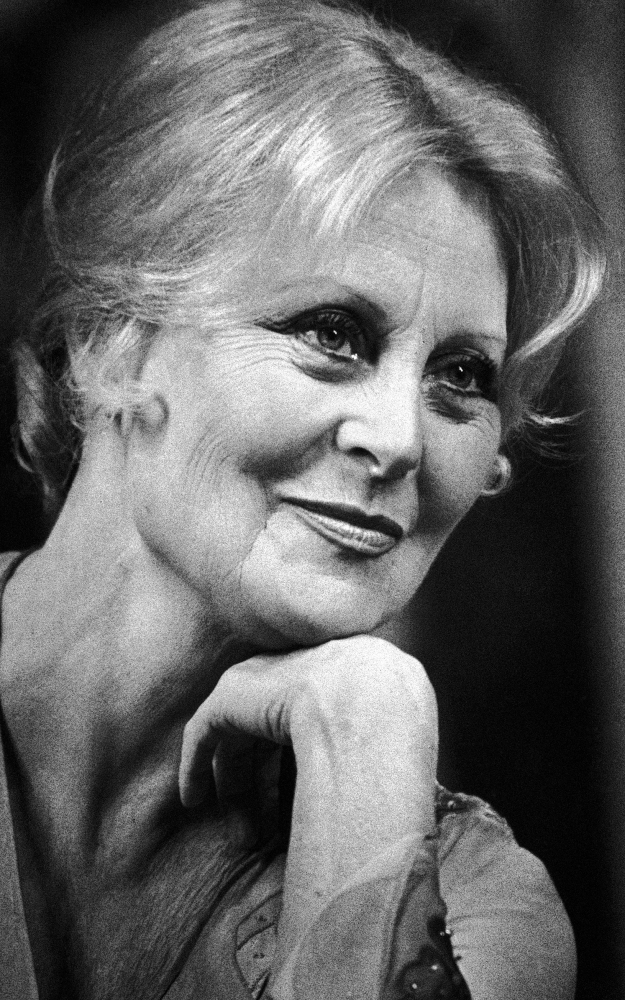Michele Morgan, a French movie actress who starred in the moody masterpiece “Port of Shadows” and who, during a brief Hollywood sojourn, helped introduce Frank Sinatra to film audiences in his first big role, died Dec. 20. She was 96.
French President François Hollande announced the death, calling her “an elegance, a grace, a legend that left a mark on many generations. … The greatest directors called upon her, and she was part of masterpieces that still live in everyone’s memories.” No other details were provided.
In a career spanning seven decades, Morgan was best known as the ethereal femme fatale in “Port of Shadows” (1938), a film at the core of the poetic realism movement in French cinema. As visually sumptuous as they were bleak, the movies often involved working-class characters and social outcasts whose destinies are beyond their control — in essence, a precursor to the cynical and sinister world of American film noir.
“Port of Shadows” featured Jean Gabin, the biggest star in France, as an army deserter on the lam in a seedy port of call. He enjoys a passionate interlude with a 17-year-old waif sporting a beret and transparent raincoat (Morgan) before she ultimately seals his doom through her association with two unsavory underworld figures.
The film was directed by Marcel Carne and written by the surrealist poet and screenwriter Jacques Prévert, the team behind “Daybreak” (1939) and “Children of Paradise” (1945), regarded as examples of French cinema at its most sublime.
Shrouded in fog, squalor and melancholy, “Port of Shadows” is less concerned with the machinery of plot than with conveying a sustained mood of uncompromising bleakness.
Film critic Pauline Kael once called the movie “a breath of fresh air to American filmgoers saturated with empty optimism.” It also launched Morgan as an international star for the next two decades.
After a further series of dark-lady roles, several opposite her lover Gabin, she spent World War II making movies in the United States. She was stuck in propaganda and espionage fare for RKO Studios, including “Joan of Paris” (1942) with Paul Henreid and “Passage to Marseille” (1944) opposite Humphrey Bogart.
She was a leading contender for the Ingrid Bergman role in “Casablanca” (1942), but RKO demanded a huge loan-out fee that the rival Warner Bros. would not meet. Instead she appeared in “Higher and Higher” (1943), a musical with Sinatra in which she played a maid impersonating a debutante.
“Why look back?” she told the New York Times a few years later. “I was so young then, so miserable with my poor attempts at English. I used to say ‘crying trees’ for weeping willows. You didn’t mow the lawn. No, you shaved it. And those pictures. Those stinkers.”
By war’s end, she returned to France and immediately reignited her career with “Pastoral Symphony” (1946), based on a story by the future Nobel laureate Andre Gide. Morgan won the best actress award at the Cannes film festival for her portrayal of an orphaned blind girl in love with a married Swiss pastor who also draws the attention of his son.
“Miss Morgan’s performance is an exquisite piece of art – tender, proud, and piteous in its comprehensions of the feelings of the blind,” New York Times film critic Bosley Crowther wrote.
In “The Fallen Idol” (1948), a stylish suspense drama based on a Graham Greene story, Morgan added vulnerable depths to an otherwise supporting role as the mistress of an embassy butler (Ralph Richardson), who is accused of killing his cruel wife.
Throughout the 1950s, Morgan remained one of France’s most prominent leading ladies, often in romantic, adulterous and melodramatic parts. She also played many historic roles, as Joan of Arc in “Daughters of Destiny” (1954), Joséphine de Beauharnais in “Napoléon” (1955) opposite Daniel Gélin in the title role, and Marie Antoinette in “Shadow of the Guillotine” (1956).
One of her subtlest performances was as the divorcée who resists but then gives in to a cavalry officer (Gérard Philipe) who romances her on a bet in “The Grand Maneuver” (1955), directed by Rene Clement.
She had a supporting role as a countess in the 1966 war film “Lost Command,” starring Anthony Quinn and Alain Delon, and had a late-stage starring role as a wealthy widow who is a suspect in the killing of her faithless husband in “Cat and Mouse” (1975), a thriller directed by Claude Lelouch.
Simone Renée Roussel was born in the Paris suburb of Neuilly-sur-Seine on Feb. 29, 1920, and grew up mostly in Dieppe. After dramatic study under actor René Simon, she entered films as an extra in the mid-1930s and was spotted by director Marc Allegret, who also guided the early careers of Simone Simon and Jean-Pierre Aumont.
She became an overnight sensation as a young girl accused of a crime of passion in Allegret’s “Gribouille” (1937) opposite the star, Raimu. Her seductive charms were then used to first-rate effect in “Port of Shadows.”
Her first marriage, to American actor William Marshall, ended in divorce. Her second husband, French actor Henri Vidal, died in 1959. She then was the companion of director, actor and writer Gérard Oury until his death in 2006.
A son from her first marriage, Mike Marshall, died in 2005. Information about survivors was not immediately available.
Send questions/comments to the editors.



Success. Please wait for the page to reload. If the page does not reload within 5 seconds, please refresh the page.
Enter your email and password to access comments.
Hi, to comment on stories you must . This profile is in addition to your subscription and website login.
Already have a commenting profile? .
Invalid username/password.
Please check your email to confirm and complete your registration.
Only subscribers are eligible to post comments. Please subscribe or login first for digital access. Here’s why.
Use the form below to reset your password. When you've submitted your account email, we will send an email with a reset code.